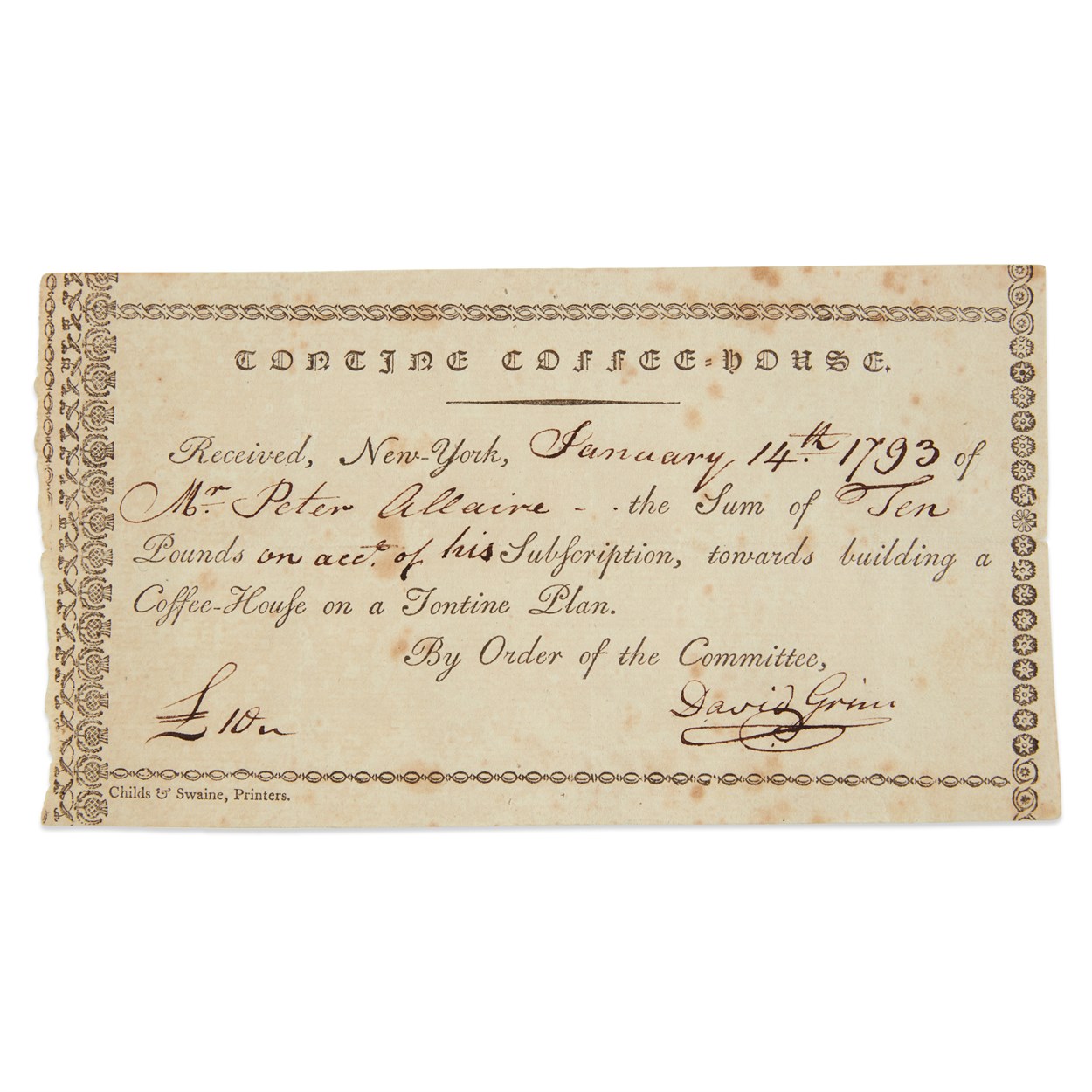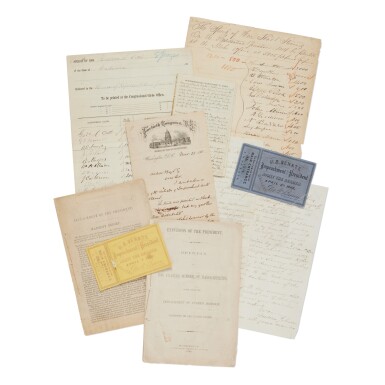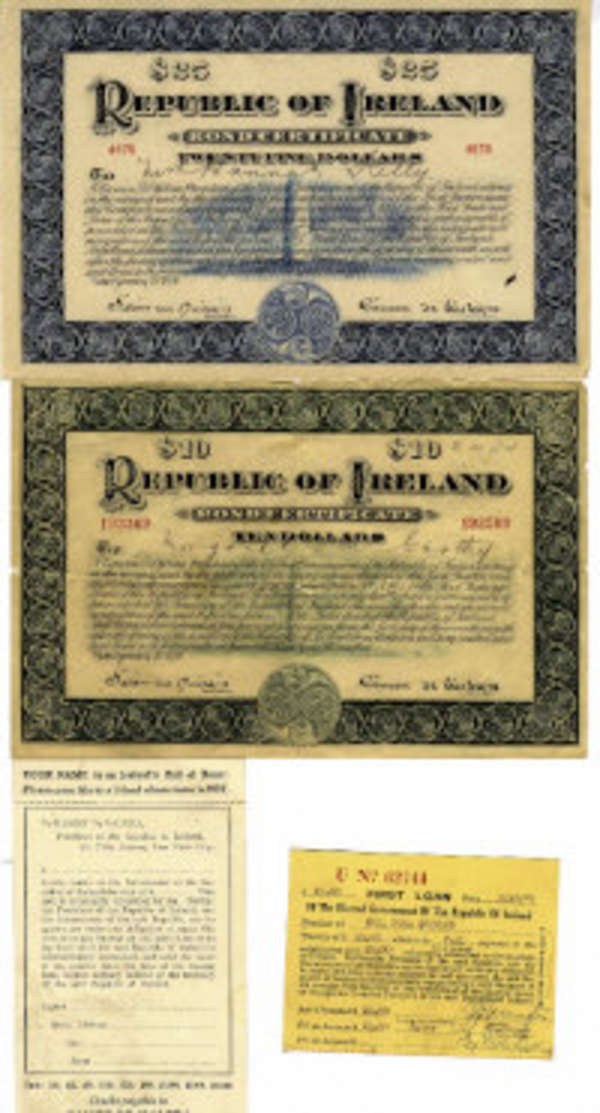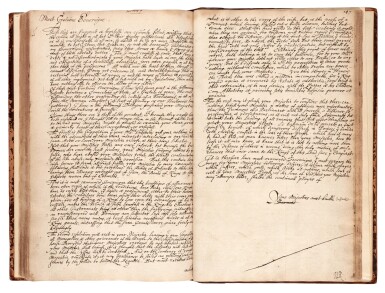Printed Subscription, signed New-York: Hugh Gaine, January 13, 1792. One sheet folded to make four pages, 5 1/4 x 7 3/4 in. (133 x 197mm). Partially-printed subscription for the "Society for Establishing Useful Manufactures," in the state of New Jersey (No. 5328), issued to Cornelius Ray (b. 1755; second president of the New York Branch of the Bank of the United States), for which "on the payment of the several installments...he or his assigns, will be entitled to One Share in the stock of said society"; signed by William Duer (1743-99), as governor; counter-signed by Elisha Boudinot (1749-1819), as Secretary pro Temp; further signed on the second page by board members Benjamin Walker (1753–1818) and Nicholas Low (1739-1826), recording four payments received from Ray. Very lightly worn. A fine example. Together with: Manuscript Promissory Note New York, January 20, 1795. One sheet, 3 3/4 x 8 in. (95 x 203mm). Manuscript promissory note, signed by Nicholas Low, as governor of the Society for Establishing Useful Manufactures, to Jonathan Burrall Esq., cashier of the New York Office of Discount and Deposit of the Bank of the United States, for $15,000; docketed on verso by Low. Creasing from original folds; left and bottom edges slightly worn. Together with: Printed Paterson Lottery Ticket (Newark, New Jersey): Woods, no date (ca. 1790s). One small sheet, 1 3/4 x 4 1/8 in. (44 x 105mm). Partially-printed Paterson Lottery ticket (No. 527): "This Ticket will entitle the Bearer to such Prize as may be drawn against its Number, in the Lottery of the Society for establishing Useful Manufactures, erected by Virtue of an Act of the Legislature of the State of New-Jersey—subject to a Deduction of 15 per Cent"; signed at bottom by Jonathan Rhea (1754–1815), manager of the lottery scheme; further inscribed on verso: "Undrawn 20th May 1797/W. Blackburn/Sam Smith McCrosky." A fine example of a lottery ticket used by the Society to help secure funds for its endeavor. The Society sold 38,000 tickets at $7 apiece, awarding 14,000 prizes. Ultimately this plan failed, as prohibitive laws in various states in which these tickets were to be sold made the endeavor risky. New plans were devised, and a lottery eventually took place, but it is doubtful whether expenses were covered or a profit was made. A fine group of three documents relating to the Society for Establishing Useful Manufactures. Devised by Alexander Hamilton and Assistant Secretary of the Treasury Tench Coxe, the Society was established to promote industrial development along the Passaic River in New Jersey in an effort to gain independence from British industrial power. Using ideas first formulated in his famous Report on Manufactures (see lot 17), Hamilton, alongside Coxe, formed a public-private partnership to develop a model manufacturing town to compete with industrial centers in England. Present-day Paterson, New Jersey was chosen as the site of this endeavor due to its proximity to the Great Falls of Passaic, a 70-foot tall waterfall, that could help power the mills and factories outlined in the Society's plans. In 1791 the New Jersey legislature passed a resolution granting the society exclusive rights to the land as well as crucial tax abatements. The town was named after then-current Governor of New Jersey, James Paterson who signed the charter. Hamilton and the board of directors quickly set to work and raised over $500,000 in startup capital to realize their plans, a huge sum for the time. They hired Charles L'Efant, who would go on to design the future capital in Washington, D.C., as the town planner, designing raceways, aqueducts, and more. His grand vision eventually became too costly, and before he even began he was fired and replaced by William Colt, of gun manufacturing fame. The Society's plans were severely hampered, and their image tarnished, by the Panic of 1792 and the corrupt dealings of the Society's governor, William Duer (signer of the subscription above). I
Printed Subscription, signed New-York: Hugh Gaine, January 13, 1792. One sheet folded to make four pages, 5 1/4 x 7 3/4 in. (133 x 197mm). Partially-printed subscription for the "Society for Establishing Useful Manufactures," in the state of New Jersey (No. 5328), issued to Cornelius Ray (b. 1755; second president of the New York Branch of the Bank of the United States), for which "on the payment of the several installments...he or his assigns, will be entitled to One Share in the stock of said society"; signed by William Duer (1743-99), as governor; counter-signed by Elisha Boudinot (1749-1819), as Secretary pro Temp; further signed on the second page by board members Benjamin Walker (1753–1818) and Nicholas Low (1739-1826), recording four payments received from Ray. Very lightly worn. A fine example. Together with: Manuscript Promissory Note New York, January 20, 1795. One sheet, 3 3/4 x 8 in. (95 x 203mm). Manuscript promissory note, signed by Nicholas Low, as governor of the Society for Establishing Useful Manufactures, to Jonathan Burrall Esq., cashier of the New York Office of Discount and Deposit of the Bank of the United States, for $15,000; docketed on verso by Low. Creasing from original folds; left and bottom edges slightly worn. Together with: Printed Paterson Lottery Ticket (Newark, New Jersey): Woods, no date (ca. 1790s). One small sheet, 1 3/4 x 4 1/8 in. (44 x 105mm). Partially-printed Paterson Lottery ticket (No. 527): "This Ticket will entitle the Bearer to such Prize as may be drawn against its Number, in the Lottery of the Society for establishing Useful Manufactures, erected by Virtue of an Act of the Legislature of the State of New-Jersey—subject to a Deduction of 15 per Cent"; signed at bottom by Jonathan Rhea (1754–1815), manager of the lottery scheme; further inscribed on verso: "Undrawn 20th May 1797/W. Blackburn/Sam Smith McCrosky." A fine example of a lottery ticket used by the Society to help secure funds for its endeavor. The Society sold 38,000 tickets at $7 apiece, awarding 14,000 prizes. Ultimately this plan failed, as prohibitive laws in various states in which these tickets were to be sold made the endeavor risky. New plans were devised, and a lottery eventually took place, but it is doubtful whether expenses were covered or a profit was made. A fine group of three documents relating to the Society for Establishing Useful Manufactures. Devised by Alexander Hamilton and Assistant Secretary of the Treasury Tench Coxe, the Society was established to promote industrial development along the Passaic River in New Jersey in an effort to gain independence from British industrial power. Using ideas first formulated in his famous Report on Manufactures (see lot 17), Hamilton, alongside Coxe, formed a public-private partnership to develop a model manufacturing town to compete with industrial centers in England. Present-day Paterson, New Jersey was chosen as the site of this endeavor due to its proximity to the Great Falls of Passaic, a 70-foot tall waterfall, that could help power the mills and factories outlined in the Society's plans. In 1791 the New Jersey legislature passed a resolution granting the society exclusive rights to the land as well as crucial tax abatements. The town was named after then-current Governor of New Jersey, James Paterson who signed the charter. Hamilton and the board of directors quickly set to work and raised over $500,000 in startup capital to realize their plans, a huge sum for the time. They hired Charles L'Efant, who would go on to design the future capital in Washington, D.C., as the town planner, designing raceways, aqueducts, and more. His grand vision eventually became too costly, and before he even began he was fired and replaced by William Colt, of gun manufacturing fame. The Society's plans were severely hampered, and their image tarnished, by the Panic of 1792 and the corrupt dealings of the Society's governor, William Duer (signer of the subscription above). I















Try LotSearch and its premium features for 7 days - without any costs!
Be notified automatically about new items in upcoming auctions.
Create an alert